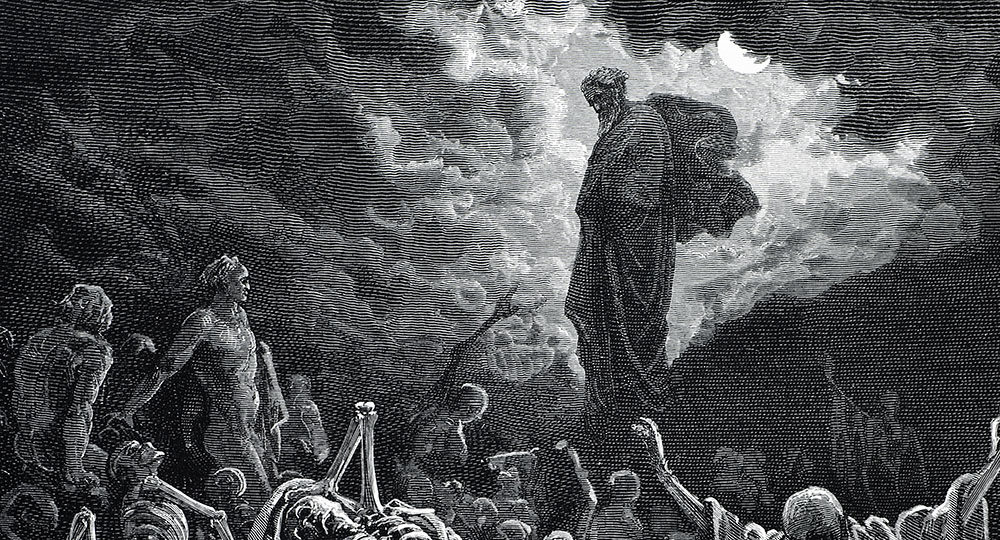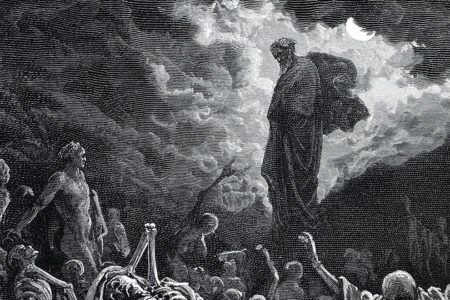These Bones Shall Live
As you will discover, this edition of Israel My Glory is dedicated to Israel and issues related to the Jewish people and their land. Recent hostilities between Israelis and Hezbollah terrorists operating from Lebanon point to the need for continuing vigilance in our prayers and encouragement for those who live in that tiny, strife-torn nation. Current trends in the Middle East consistently underscore the dynamic importance of what goes on in the region. Every nation on earth, including, of course, the United States of America, is inexorably linked to Israel and—whether secular leaders grasp it or not—God’s plan for the land and its people, the Jews.
When pondering the impact Israel has made on nations that touched it for good or evil, you can begin to fathom just how important the entire issue of Israel’s place in God’s program really is. Those who harbor ill-intended schemes against that nation would be well advised to explore the Scriptures on the subject and conduct a careful study of comparative history. After all, the well-worn admonition “To be forewarned is to be forearmed” is certainly applicable when it comes to Israel and the Jews. It can be demonstrated that significant amounts of international misery could have been avoided if the nations of bygone days had somehow understood that God was serious when He inspired Zechariah’s statement, “he that toucheth you [Israel] toucheth the apple of his eye” (Zech. 2:8).
Modern leaders, however, are not inclined to do better and, without spiritual discernment, seem to keep making the same mistake. Iraq is a textbook illustration. With the ruins of ancient Babylon within eyeshot, Saddam Hussein insists on trumpeting his intention to one day wipe Israel off the face of the map. All of his Scud throwing will prove of no avail, and one day soon the “new Nebuchadnezzar” will be off the scene and his people left to suffer the consequences.
It is generally true, fear, that even those who accept and study the Scriptures do not realize the full extent of God’s love for and dedication to His land, Israel. Multitudes of people who identify themselves as Christians fail to fully appreciate His love for the Jewish people.
A brief survey of Ezekiel 36 and 37 can provide some dramatic perspective on the path currently being followed by the chosen nation. Several enormous propositions sweep through these illuminating chapters.
God’s Unqualified Love for the Land
Central themes of the Abrahamic covenant rest in God’s promise of the land as a permanent possession and statements confirming that the physical descendants of the patriarch will inhabit the hallowed ground: “For all the land which thou seest, to thee will I give it, and to thy seed forever. And I will make thy seed as the dust of the earth, so that if a man can number the dust of the earth, then shall thy seed also be numbered” (Gen. 13:15–16).
The marvelous prophecy in Ezekiel 36:35 will shade and shape the thinking of those who wish to know the ultimate plan for the land of Israel. Regarding this, the Lord states, “This land that was desolate is become like the garden of Eden.” His words, which are specifically identified as “the word of the Lord Gᴏᴅ” (v. 4), roll across the land like the waters of righteousness that will cover the earth during the Messiah’s reign. Therefore, the inherent attachment to the land of Israel that has been evident in the character of the Jews from time immemorial is understood. It can rightly be said that, in a sense, anticipation of this future glory has been written on the hearts of long-dispersed Jewry. Ezekiel 36:1–15 concentrates on three aspects of the divine program regarding Israel.
- Those who trespass with a desire to possess the land of the Jews will be crushed: “Therefore, thus saith the Lord Gᴏᴅ. Surely in the fire of my jealousy have I spoken against the residue of the nations, and against all Edom, who have appointed my land into their possession with the joy of all their heart … Therefore, thus saith the Lord Gᴏᴅ: I have lifted up mine hand. Surely the nations that are about you, they shall bear their shame” (vv. 5, 7). Herein lies God’s perpetual warning to nations ancient and modern. Much as the fence that separated the court of Israel from the court of the Gentiles in the Herodian Temple, God forewarns trespassers on the land He has chosen for the Jewish people, “Proceed at your own peril.”
- The land will bear fruit for His people: “Ye shall shoot forth your branches, and yield your fruit to my people of Israel … For, behold, I am for you, and I will turn unto you, and ye shall be tilled and sown” (vv. 8–9). One of the glories of modern Israel is the way the land has flourished when nurtured by the hands of the returned remnant of the Jewish people. People in many parts of the world are reaping the benefits of agricultural innovations coming out of Israel. If this is true today, how much greater will be the wonders of the land fully possessed and presided over by the Messiah?
- The Jewish people will possess the land that is their inheritance. “Yea, I will cause men to walk upon you, even my people, Israel; and they shall possess thee [the land], and thou shalt be their inheritance, and thou shalt no more henceforth bereave them of men” (v. 12). The day will come—God promises—when Israel’s lamentation over their lost land will cease. Ezekiel is chronicling the final fulfillment of ecstasy emanating from the hearts of returning exiles: “When the Lᴏʀᴅ turned again the captivity of Zion, we were like them that dream. Then was our mouth filled with laughter, and our tongue with singing; then said they among the nations, The Lᴏʀᴅ hath done great things for them. The Lᴏʀᴅ hath done great things for us, whereof we are glad” (Ps. 126:1–3).
Far better things are promised for reconciled Israel: “And I will multiply men upon you, all the house of Israel, even all of it, and the cities shall be inhabited, and the wastes shall be built … and [I] will do better unto you than at your beginnings” (vv. 10–11).
The Glory of God
Verses 16 through 24 of Ezekiel 36 treat us to a grand exposition of the theme of the glory of God. The passage draws the bottom line as to why Israel is so blessed and the land He has set aside is so favored. Israel exists as a witness to the faithfulness, might, and majesty of Jehovah. Isaiah 43:10 eloquently explains: “Ye are my witnesses, saith the LORD, and my servant whom I have chosen, that ye may know and believe me, and understand that I am he; before me there was no God formed, neither shall there be after me.” The word pointedly explains, “I do not this [restore the land and the people] for your sakes, O house of Israel, but for mine holy name’s sake” (v. 22). God was witnessing to His own glory through the witness nation He had chosen.
Therefore, at the root of Israel’s cyclical dispersions from their land is the fact that, in His words, “they profaned my holy name” (v. 20). Israel’s transgressions, for which they would be corrected, caused surrounding nations to mock God and make light of those who were His designated people: “when they [the nations] said to them, These are the people of the Lᴏʀᴅ, and are gone forth out of his land” (v. 20). At issue throughout the passage are the sanctity and honor of the name of God. But, just as Israel’s corrective phase would result in humiliation and derision, her restoration will establish, in even more magnificent ways, the glory of the God who brought it about. His name will, in the end, be sanctified: “and the nations shall know that I am the Lᴏʀᴅ, saith the Lord Gᴏᴅ, when I shall be sanctified in you before their eyes” (v. 23).
In God’s own words, Israel was conceived, formed, and fashioned for His glory: “for I have created him [Israel] for my glory; I have formed him; yea, I have made him” (Isa. 43:7).
The Reconciliation and Restoration of Israel
The story of the Jew is, in the final analysis, the historical demonstration of just how God’s integrity will be vindicated and His glory displayed. Ezekiel 36:25 through 38 structures the process by which this will be accomplished.
First is national repentance: “I will,” His Word declares, “also save you from all your uncleannesses” (v. 29). Fundamental to the process is repentance: “Then shall ye remember your own evil ways, and your doings that were not good, and shall loathe yourselves in your own sight for your iniquities and for your abominations” (v. 31). The result, as in all true repentance, is a turning to God from idolatry and every evil way.
Next is revival, a revival that goes far beyond anything known in the history of Israel and the Jewish people. It is obviously related to the yet-future phase of reconciliation to the Messiah. The reality of the revival relationship will be a new heart, a new spirit, and a new condition: “A new heart also will I give you … And I will put my Spirit within you … and ye shall be my people, and I will be your God” (vv. 26–28).
Following revival is restoration. We read in verse 24, “For I will take you from among the nations, and gather you out of all countries, and will bring you into your own land.” Once they are securely in the land, there will be no more famine, no more idolatry, no more evil ways, no more weary days of being a reproach among the nations. Cleansed, secure, and satisfied, Israel will dwell in the land promised to Abraham for his descendants—a land that “is become like the garden of Eden” (v. 35).
Finally, there will be recognition by nations. Testimonially, Israel’s repentance, revival, and restoration, will be surpassing evidence of the faithfulness, power, and glory of the God who cannot be corrupted or dissuaded from His purposes by any human contingency. He has made promises; He will deliver on those promises. Consequently, surviving nations will be compelled to acclaim His glory: “Then the nations that are left round about you shall know that I, the LORD, build the ruined places, and plant that which was desolate. I, the Lord, have spoken it, and I will do it” (v. 36).
In a marvelous way, chapter 37 colors the picture given in Ezekiel 36 and exposes the process by which all of this will take place. The vivid vision has inspired toe-tapping refrains that have reminded successive generations that one day the dry bones that were scattered Israel will come together, rise up, and “walk around” (37:1–10). That promise is sure. As a matter of fact, we are seeing, in the return of Jews from 150 nations to the land, harbingers of the climactic regathering described here.
A forlorn question rises from the wondering prophet who stood overlooking the valley covered with the bones of the dead. His query has been asked by every generation that has been touched by the wandering Jew during the protracted dispersion: “can these bones live?” (v. 3). The rational answer of every human evaluator would, of course, be “No!” But the point of the vision is that the God of the improbable can do the impossible. There will be “a shaking” (v. 7) in the valley. Bone upon bone, flesh upon sinew, skin over all, and with breath from the four winds, these bones will rise up and form “an exceedingly great army” (v. 10).
The Lord’s explanation of the vision clarifies who these bones represent—they are “the whole house of Israel” (v. 11)—and the process by which Israel’s “lost hope” will be restored. Verses 12 through 14 embody three phases of Israel’s end-time trek to its destiny under the Messiah.
Phase I, Return to the Land: “Therefore, prophesy and say unto them, Thus saith the Lord GOD: Behold, O my people, I will open your graves, and cause you to come up out of your graves, and bring you into the land of Israel” (v. 12). The implication, clearly compatible with the vision, is that this return to the land will be in unbelief—a body without breath.
Phase II, Recognition That Their Return Is God’s Doing: “And ye shall know that I am the Lᴏʀᴅ, when I have opened your graves, O my people, and brought you up out of your graves” (v. 13).
Phase III, Reconciliation to the Messiah: “And shall put my Spirit in you, and ye shall live, and I shall place you in your own land; then shall ye know that I, the Lᴏʀᴅ, have spoken it, and performed it, saith the Lᴏʀᴅ” (v. 14).
To this stunning visual prophecy, the Lord adds a verbal object lesson in speaking of two sticks coming together in His hand (vv. 15–28). They represent the nation reunited. When the nation was divided under Solomon’s son, Jeroboam, the split became irreparable. Israel was disbanded, and Judah subsequently dispersed. However, “Ephraim, and … all the house of Israel, his companions [the northern tribes],” will be joined, at long last, to Judah and Benjamin, the southern tribes (v. 16), and they shall be united under the regency of “David, my servant, [who] shall be king over them” (v. 24). Then …
“they shall dwell in the land that I have given unto Jacob” (v. 25);
“I will make a covenant of peace with them” (v. 26a);
“I … will set my sanctuary in the midst of them for evermore” (v. 26b).
At home, with peace, in the presence of the Lord—who could ask for any more? Or how could it be better said than the Spirit’s way, to conclude our visit to Ezekiel 36 and 37: “And the nations shall know that I, the Lᴏʀᴅ, do sanctify Israel, when my sanctuary shall be in the midst of them for evermore” (v. 28).








